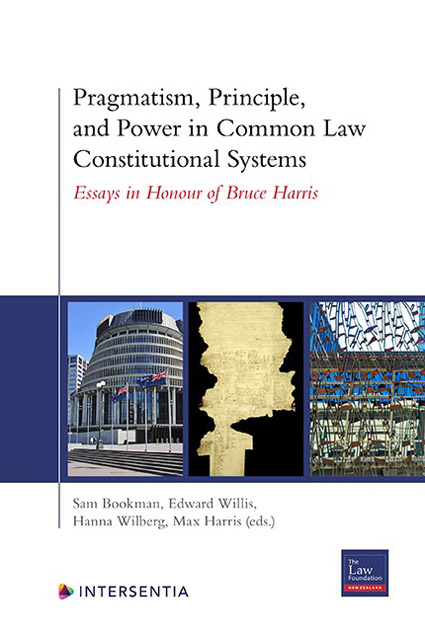 Pragmatism, Principle, and Power in Common Law Constitutional Systems
Pragmatism, Principle, and Power in Common Law Constitutional Systems Book contents
- Frontmatter
- Foreword
- Preface
- Contents
- The Writings of Professor Bruce Harris
- List of Cases
- List of Contributors
- Introduction
- Part I The Nature of Executive Power
- Part II Issues Concerning The Judiciary: The Nature of Judicial (and Executive) Power
- Part III Issues Concerning The Judiciary: Creativity and Pragmatism in Judicial Method
- Part IV Issues Concerning The Judiciary: Judicial Appointment and Accountability
- Part III The Nature of Unwritten Constitutions and Their Future
- Index
Dworkin and the Treaty of Waitangi as a Legal Principle
Published online by Cambridge University Press: 19 November 2022
- Frontmatter
- Foreword
- Preface
- Contents
- The Writings of Professor Bruce Harris
- List of Cases
- List of Contributors
- Introduction
- Part I The Nature of Executive Power
- Part II Issues Concerning The Judiciary: The Nature of Judicial (and Executive) Power
- Part III Issues Concerning The Judiciary: Creativity and Pragmatism in Judicial Method
- Part IV Issues Concerning The Judiciary: Judicial Appointment and Accountability
- Part III The Nature of Unwritten Constitutions and Their Future
- Index
Summary
INTRODUCTION
This contribution concerns the status of the Treaty of Waitangi (‘the Treaty’) in New Zealand law. It is stimulated by reading Bruce Harris's excellent recent book, in which he analyses the New Zealand constitution ‘in terms of principles’. Bruce's analysis of the constitution in that book is as clear and comprehensive as I remember his classes to be, when I had the good fortune to have him as my teacher, of both contract law and administrative law, at the Otago law faculty, in the 1970s. Subsequently, Bruce has had a long and distinguished career – as teacher, scholar and dean – at both the Universities of Auckland and Otago. I salute his achievements. It was a pleasure to have him as my teacher and later as a colleague. I am delighted to have the chance to honour him in this book.
Chapter three of Bruce's recent book concerns ‘The Principle of Legislative, Executive and Judicial Respect for the Treaty of Waitangi’. I propose to consider how this principle relates to concepts of law. First, I discuss the traditional – positivist and dualist – account of the circumstances in which the Treaty is recognised by the courts as part of the law of New Zealand. Next, I canvass two, related, alternative concepts of law, drawn from the work of Ronald Dworkin and Mayo Moran respectively. I suggest that these alternative concepts of law provide a better foundation for an explanation of how the courts use the Treaty in their reasoning than that provided by a strictly positivist concept of law. I conclude, drawing on these alternative concepts of law, that – contrary to the traditional view – the Treaty ‘itself’ is part of New Zealand law.
THE LEGAL STATUS of THE TREATY
The traditional view (as I will call it) of the legal status of the Treaty in New Zealand is the one expounded by the Privy Council, in 1941, in Hoani Te Heu Heu Tukino's case. On that view, the Treaty is not part of New Zealand law unless ‘incorporated’ into the relevant field of domestic law by legislation. This view reflects, firstly, the notion that a proposition will only count as law when ‘positively’ incorporated into a source of law recognised and enforced in the courts. and, secondly, it reflects the dualist conception of the relationship between international and national (or domestic) sources of law.
- Type
- Chapter
- Information
- Pragmatism, Principle, and Power in Common Law Constitutional SystemsEssays in Honour of Bruce Harris, pp. 247 - 262Publisher: IntersentiaPrint publication year: 2022


